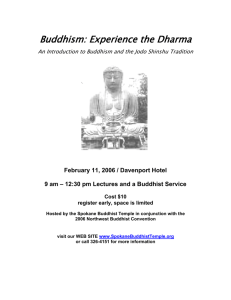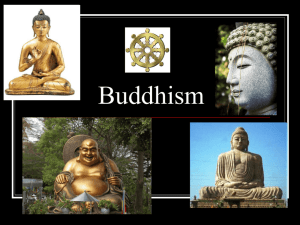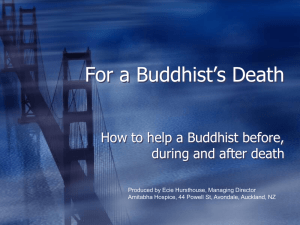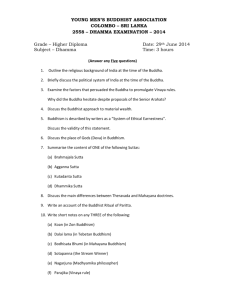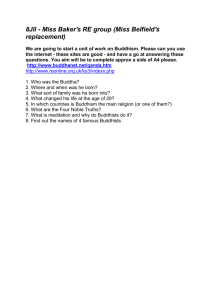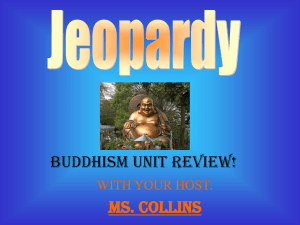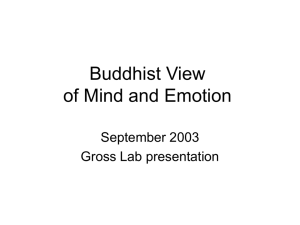Buddhist Revision Part 1
advertisement
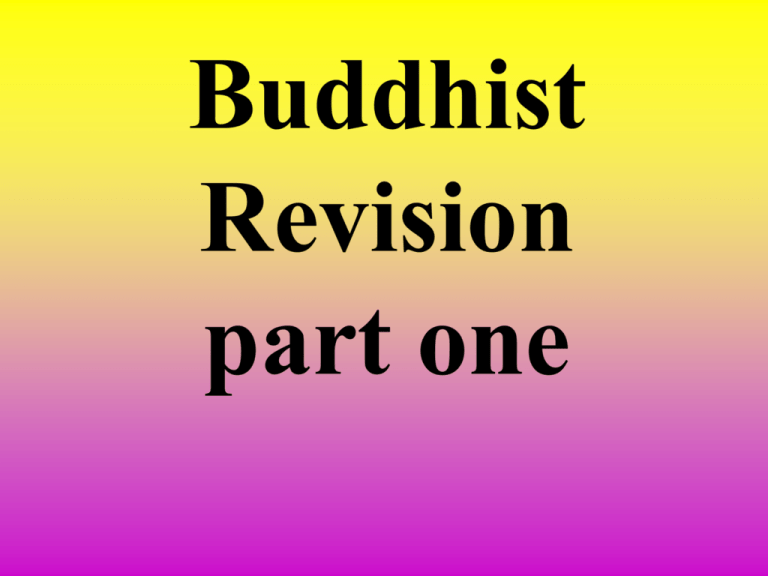
Buddhist Revision part one You must look at the full GCSE Buddhist presentation before the essential guide. Here you will be reviewing what you have already learned. Buddhism The essential guide Buddhism Revision Siddhartha Gutama born a prince. He was born in North-East of INDIA, today the country called NEPAL. Saw; old age, sickness, death & a holy man Left family became an ascetic gave it up reached Enlightenment. ( highest achievement) Nirvana Reincarnation ( reborn) Karma. ( the consequences of your actions) (The Buddha taught there was no God.) Essential Knowledge The 5 Precepts Not to harm living beings. Tipitaka (scriptures) Not to take what is not given. The Noble Eightfold Path Avoid improper sexual behaviour Avoid false speech. Avoid drugs that cloud the mind Right Speech Perfect Action. Mandala ( a picture) Mantra ( word in meditation) The Three marks of Existence Perfect Livelihood Perfect Effort meditation Vihara ( temple) The Four Noble Truths “Suffering happens everywhere all the time.” “That suffering is caused by wanting too much.” “Greed and selfishness can be stopped.” “The best way was to become enlightened “Annica.” Perfect Awareness IMPERMANENCE Perfect Meditation Perfect Vision Perfect Emotion The Buddha taught that everything in life changes. Nothing lasts. “Anatta” The Buddha taught that there was no soul. The Three Jewels I go to the Buddha for refuge. I go to the dharma for refuge. I go to the Sangha for refuge. Key concepts Calm, tranquillity, discipline, spirituality, peaceful, non violent,wisdom, reflective “Dukkha” That suffering is everywhere. Buddhist Monks All men will live as a monk for a while. Buddhism is a way of life. Is Buddhism relevant for the 21St century? Yes it is relevant for the 21st century. Today people suffer from stress & this religion can help people . It can calm them. It can give them a purpose in life. It can help them be inspired in a world with terrible suffering. meditation and the noble eightfold path could solve many of the psychological problems people have. What can Buddhism teach people? Buddhism can teach people that life can be fulfilling. They may not be able to make sense of the world. Buddhism provides an answer. A lot of Buddhism is about not harming people and helping. It is practical. Sitting and meditating for a while each day would not do anyone any harm. Most people would benefit from a simple understanding of BUDDHISM. Why be a Buddhist? What do you think? YOU NEED TO KNOW THAT The Buddhist Scriptures are The TIPITAKA Why be a Buddhist monk? A Buddhist monk learns not to be selfish. They must not lie. They must not ask for food. They must give up sex. They must meditate. In turn they will learn discipline and be able to hopefully reach enlightenment. Buddhist Monk You need to know that all men must be a monk for at least a week at one time in their life. Read about their lives. Why would anyone want to live like this? Buddhist’s have monks and nuns. A Buddhist nun. She is required to shave her head as well as the men. Buddhist Prayer flag What they believe is when the wind blows the prayer is said. The mandala is a Buddhist picture used for meditation. This is important it can be in the exam. THE MANDALA Buddhist mandala sand paintings are painstakingly poured grain by grain using a small funnel. Mandala is a Sanskrit word meaning cosmogram or "world in harmony". If they are made in sand they do not last very long. This is a pity but also accepted as part of Buddhism. A Buddhist Mandala used for Meditation. Made by monks with sand A mantra is a word used for meditation The impermanent sand mandala used for Meditation The Buddhist Image. There are such images in the Buddhist Shrines Key words associated with Buddhism: Calm, wisdom, spiritual, meditation, focused, still, at peace, in harmony with nature, non violence, empathy Calm mind Peaceful Gentle Loving Wisdom Spiritual Focused Aware Answer this question. What do we learn about the Buddha from his life story? We learn that the Prince was a determined individual. He tried to find the answer to suffering by embracing his own suffering in the world. He fasted. He meditated and lived as an ascetic after he had left his family. He later renounced asceticism. He went for a moderate way. He resisted temptation.Finally he achieved the enlightenment he was looking for. We can never know what that meant exactly. What we can say is that it was a peace of the mind. A tranquillity, a haven a serene contentment. He was not unaware of the world after enlightenment. What he did was have his eyes opened to all people in their suffering. His method was to teach people to meditate. Then they had to follow his teachings. They are all quite simple. Then if you lived a good life you would avoid reincarnation and achieve enlightenment. The reason why people become Buddhists would be that they agree with the Buddha that life is unsatisfactory and that they seek to find meaning in believing that continually striving for perfection is the answer.
